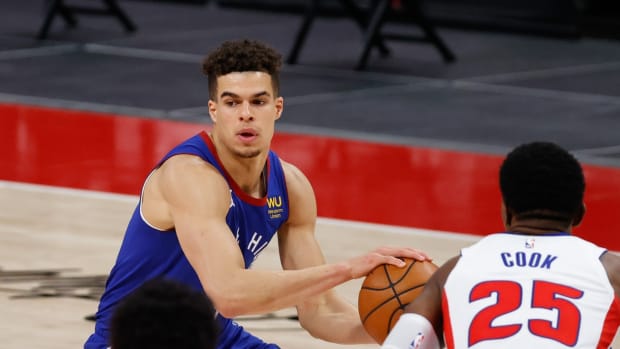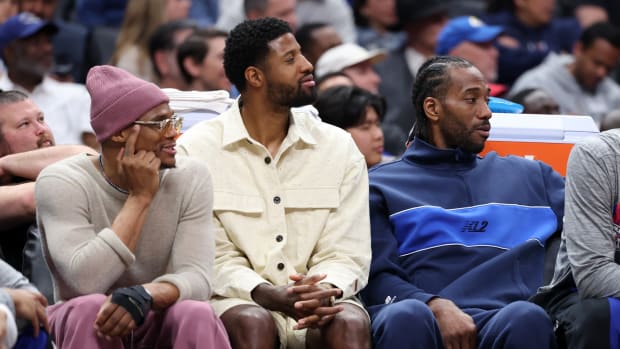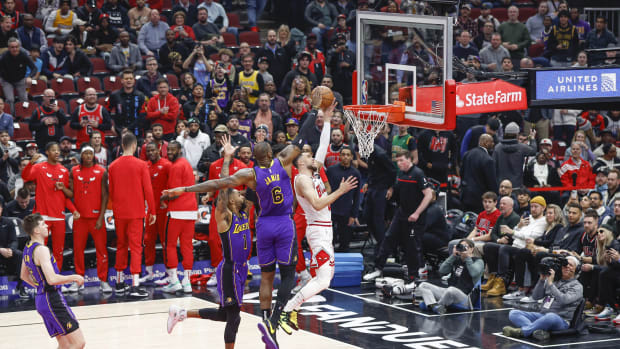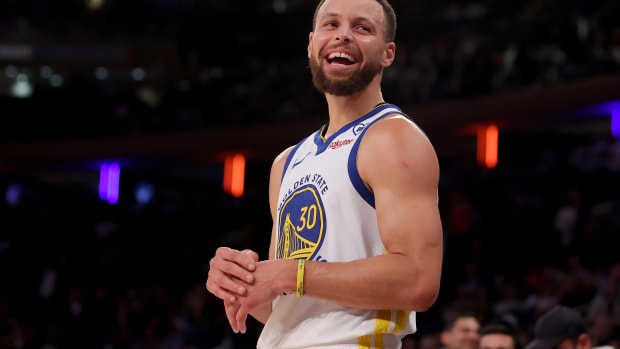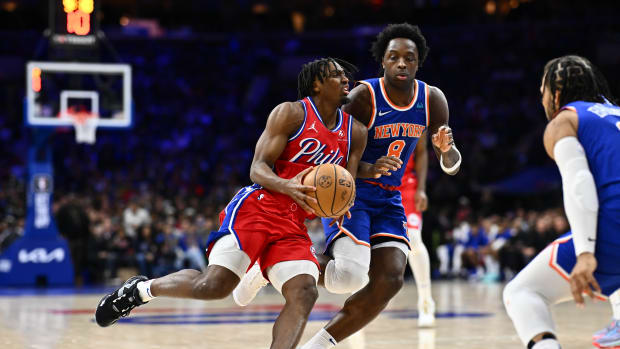The Fundamentals: Justise Winslow is rare Heat rookie to break through
There is something undeniable in the game of Justise Winslow. Watch any stretch of Heat basketball and you’ll come to notice him—the rookie forward sneaking into the mix offensively, fighting inside to gather rebounds, and contesting shots closely without fouling. None of Winslow’s contributions are especially loud at this point, yet they’re gripping in their volume; already he has a way of layering his many, seemingly minor contributions in a way that makes a very real and tangible impact.
“He's ended up being one of the top five in minutes played for us,” Heat coach Erik Spoelstra said. “Often times it'll be a less-than-spectacular box score but he's one of our team leaders in plus-minus. I don't think that's a coincidence.”
2016 NBA New Year’s resolutions for every team in the Eastern Conference
This speaks to one of the NBA season’s early revelations: The Miami Heat, a team stocked with established veteran talent, is better with Winslow, a 19-year-old rookie, on the floor. The film confirms it. The data corroborates. Hell, even Dwyane Wade is on-record on the point, at least as it relates to Winslow improving upon Miami’s already impressive defense. The fullness of Winslow’s game along with a healthy, team-oriented worldview has made him a utility player of immediate value. He does anything and everything for the Heat because he understands the power of even the smallest actions.
“Whether it's screening, cutting, spacing, or defensively just being in the right spot, getting all the rotations, blocking out—those are things that don't really show up on the stat sheet,” Winslow said. “But your teammates notice and they don't take that for granted.”
The concrete disconnect of the box score isn’t kind to Winslow. Yet at the point where his value can be seen under the microscope, discerned from more detailed statistics, and felt in abstraction, why would one pin their evaluation of Winslow to a scorekeeper’s tally marks? The kind of usage necessary for Winslow to pile up points and assists would be impossible in Miami, and most available rebounds are gobbled up by Hassan Whiteside and Chris Bosh. Winslow is positioned instead to find the space between the team’s capable scorers and creators. That in itself is a delicate art, one which Heat coaches and executives felt that Winslow held a particular aptitude for at the time of his drafting.
They appear to have been right on the money.
“That's what you're trying to look for in this league is guys that have the emotional stability to think of the game as a competition and how to make winning plays,” Spoelstra said. “When you bring somebody in, you'll develop guys on how to run a better pick-and-roll, how to develop your three-point range, how to become a better individual defender, and understand scouting reports,” Spoelstra said. “Those things take experience and take time. The other stuff is what made [Winslow] a standout.”
• BEST OF 2015: Top 10 NBA features of 2015 | Craziest NBA moments
It takes a certain perspective to understand that basketball is, and will always be, a game of compromise. Young players often lack it; the pressures for rookies to perform immediately, quiet doubts, validate their draft positioning, and establish a place in the league are conducive to all kinds of overstretch. Winslow seems largely immune to those influences, and has found success instead by staying in his lane on offense, digging in on defense, and leveraging his instincts as a player to create a productive fit.
Winslow might see a teammate in trouble and spring out of the corner for a dribble hand-off. Winslow could contain an opposing scorer on the perimeter in such a way that Miami doesn’t have to budge from its basic defensive formation, keeping everything solid and removing the need for his teammates to scramble in rotation. He might turn a kick-out from Wade or Goran Dragic into an even more fruitful opportunity by making the swing pass to the next man in line. In knowing how Hassan Whiteside likes to chase blocks, Winslow may crash down to get a body on Whiteside’s man to help secure a rebound.
“It's just understanding how everyone plays,” Winslow said. “Understanding how you can complement them and make their job a little easier.”
The most overt way Winslow does this is with his defense. Wade and Luol Deng’s best defensive days are behind them. It’s up to Winslow, then, to handle some of the NBA’s most unenviable defensive assignments. Spoelstra likes the rookie as an option there in part for his length and athleticism, but also for Winslow’s competitive edge and how quick he is on the uptake.
“Scorers have gone at him but he's been able to learn and adapt,” Spoelstra said. “If he gets beat on something one time, he puts it into his library not to get beat on that same action another time.”
Data Dimes: What happened to the Western Conference’s dominance?
Going up against the NBA elite brings plenty of those teachable moments. Winslow plays uncommonly good defense for a rookie; already he plays up into his man to take away options, stays down relatively well on opponents’ pump fakes, and executes the basics of Miami’s defensive system. All of this helped him earn Spoelstra’s trust quickly enough to be thrown into the fire the first week of his season, when Winslow ended up guarding LeBron James and James Harden in back-to-back games. He held his own on both occasions, which is all one could possibly ask.
In the weeks since, Winslow has regularly drawn whichever highly skilled, long-armed, athletically dominant wing an opposing team has to offer. Every case is unique, and Winslow—armed by specific instruction from Spoelstra and his staff—is making a database. In his first encounter with Kevin Durant, for example, Winslow made it a point to disrupt Durant’s pull-up rhythm at all costs.
“Don't just let him walk into a pull-up,” Winslow said. “Make him try to take off-balance shots and keep a body on him. That kind of guy you don't want to give a lot of space. You'd rather he pass the ball or even do something going towards the basket. So with that in mind, you just try not to give him easy, rhythm jumpers.”
In battling the burlier Carmelo Anthony, the positioning of isolation sequences changed slightly along with the defensive emphasis.
“[Anthony’s] a bigger guy,” Winslow said. “He has some height and some weight on me. With that, you want to kind of use your quickness. He has a great first step but a lot of the time with him, he's catching the ball isolated in the high post. So you just want to get into his body. I trust my teammates to be there behind me.”
Winslow encountered a wholly different approach in playing the Pacers and Paul George, whom he cited as one of the toughest matchups of his season. Frank Vogel’s team goes to great lengths to free George by working him around choreographed screens and capitalizing on misdirection. Winslow, in one of the longest nights of his young season, tried to keep up as George went for 36 points.
“I think what makes [George] special is he can be a great isolation player but he moves a lot in comparison to a lot of the other great scorers,” Winslow said. “He's not just solely isolations; he's coming off down screens, rip screens, and all type of stuff. He's constantly on the move.”
concedes.), though he’s already showing some progress. Miami trusts in his attention to detail in addressing those kinds of issues long-term.
The same goes for Winslow’s jumper, an oft-cited concern around draft time that remains one of the few elements of his game that isn’t quite up to snuff. Winslow is shooting just 30% outside the paint this season, according to NBA.com, and just 28.9% on what are typically wide open corner threes. That kind of inaccuracy is dangerous because it allows opponents to clog the paint and manipulate matchups, both of which bear out in the fact that Miami—a team already short on consistent three-point shooters—has scored more efficiently with Winslow off the floor. His other contributions bridge that gap and then some to make him a positive overall influence, though range shooting remains the most prominent caveat to the rookie’s early success.
In address, the Heat have Winslow on a specifically tailored shooting regimen with assistant coach Chris Quinn to solidify his mechanics and guide him along. Spoelstra is confident that Winslow will improve, but Miami is also working with the rookie forward on ways to navigate around slacking defensive coverage.
“Similar to how we've developed Dwyane, we're developing [Winslow] as an off-ball cutter,” Spoelstra said. “To constantly move into space. The ball will find energy. To learn how to use screens off-ball. To learn how to post on secondary post-up actions. And then, when the ball is in his hands, I think he will continue to become a better playmaker whether it's in a pick-and-roll situation he's handling or at the elbow, where we like to have a lot of our playmakers.”
Heat’s Goran Dragic still searching for his own lane in Miami offense
So long as Winslow continues to clank from the corners, those kinds of tools will be invaluable. The final yield, too, should be a version of Winslow that’s all the more versatile and all the more adaptive. It’s clear that Miami doesn’t want a spot shooter but a fully functional offensive player—one who could eventually knock down jumpers, to be sure, but who would also be capable of putting the ball on the floor and making smart decisions against a reacting defense.
Any such development, while pointed, comes secondary in Miami to the fact that Winslow can already help a team pushing to be as competitive as possible. Winslow has the potential to be a special player down the line. He was also drafted by a team built to make a run in the immediate and that, in its recent history, has prioritized playing learned, reliable veterans over younger prospects.
“We're not playing him just to develop him,” Spoelstra said. “That's happening as a byproduct of him playing. We're not a give-minutes-to-young-players organization [when it comes] at the expense of winning. That's not who we are. We'll play guys if we feel that they're impacting winning.”
Winslow is the rare Heat rookie to break through–6'7" and strong enough to contend with men, 19 years old and sharp enough to make an immediate difference.































